On Unlocking the Human Genome

It is important to note, however, that this proposed trial is far from the world’s first human alteration experiment. Last April, Chinese researchers used CRISPR on 86 nonviable human embryos to study the genetic blood disorder thalassemia. The United Kingdom followed suit this February, allowing British scientists the use of CRISPR to research embryo development.
As such, the significance of the upcoming U.S. trials lies not in that the subjects are human, but in that they are adults as opposed to nonviable embryos, making the trials the first attempt to use genetically altered cells on mature subjects. In the trials, the scientists will remove cells from eighteen cancer patients, edit them with CRISPR, and reinsert them into the patients. They hope to gain insightful information regarding treatment for melanoma, sarcoma, and myeloma. But as with all scientific firsts, a question presents itself: Is this a brave step forward for science and progress, or one towards a twisted future?Opponents of human genetic engineering and the U.S. trials point to the movie GATTACA, a dystopian film in which the wealthy can genetically “upgrade” their children, further widening class divides and dangerously echoing Nazi ideals of a master race. The film serves as an ominous warning of the future if genetic modification technology is allowed to advance unchecked.
However, we live in a world where 14 million people are diagnosed with cancer every year, 420,000 of which are due to inherited gene faults, and where genetic complications and disorders result in 20 percent of all infant deaths worldwide. While the cautionary warnings of opponents of human genetic engineering are not unfounded, the upcoming U.S. trials could be invaluable in the ever-pressing search for a cure for cancer and genetic illnesses. It is unreasonable to refuse our scientists permission to explore the possibilities medical genetic technology might hold simply because we fear the worst case scenario. Shutting down a way to potentially save the lives of millions would not only be archaic, but outright immoral if we neglect to give the issue the careful consideration it requires. Unparalleled scientific progress and revolutionary medical advancement may be waiting just outside our doorstep: the only way to find out is to temporarily set aside our many fears, open the door, and see for ourselves.
<Andres Lee Northwood High School 11th Grade>
스마터리빙
more [ 건강]
[ 건강]이제 혈관 건강도 챙기자!
[현대해운]우리 눈에 보이지 않기 때문에 혈관 건강을 챙기는 것은 결코 쉽지 않은데요. 여러분은 혈관 건강을 유지하기 위해 어떤 노력을 하시나요?
 [ 건강]
[ 건강]내 몸이 건강해지는 과일궁합
 [ 라이프]
[ 라이프]벌레야 물럿거라! 천연 해충제 만들기
 [ 건강]
[ 건강]혈압 낮추는데 좋은 식품
[현대해운]혈관 건강은 주로 노화가 진행되면서 지켜야 할 문제라고 인식되어 왔습니다. 최근 생활 패턴과 식생활의 변화로 혈관의 노화 진행이 빨라지고
로컬뉴스
more한국일보 안내광고

- 렌트/리스/하숙
- 구인구직
- 중고차
- 전문업체
- 락빌, 실버스프링 대형차
- 맥클린 콘도 방1/화1/차고1
- 웃브릿지 싱글홈 지하전체 덱
- 버크 H마트 근처 타운홈
- 글렌버니근처 2층 방2 렌트
- 센터빌 차고1 타운홈 $2,900
- 창고 or 개척교회 사용가능
- 센터빌 방1 화장실1 세놓음
- 싱글홈 1층 방1 부엌, 화장실

많이 본 기사
- “뉴욕도 제쳤다”…세계 최고 부자 도시 1위는 도쿄, 그럼 서울은 몇 위?
- LA 일대 나흘간 폭우로 최소 6명 사망…산사태 위험 커져
- 트럼프 중간선거 앞두고 오바마케어 대체할 ‘트럼프케어’ 박차?
- 트럼프, ‘선거구 조정거부’ 인디애나주 공화의원에 “강력 반대”
- 폼페이오 “김정은이 핵무기 포기하게 할 당근 없다…中이 관건”
- 가자·우크라에 美지상군 배제한 트럼프, 베네수엔 “배제안해”
- “아마존 창업자 베이조스, AI 스타트업 CEO로 경영 일선 복귀”
- 형제교회 ‘횡령 사역자’는 성환철 전도사...공동의회 통해 성 전도사 횡령금액과 방법 등 밝혀
- 빈살만 왕세자 회동 하루 앞…트럼프 “사우디에 F-35 팔겠다”
- ‘이혼 후 출산’ 이시영 둘째, 상속·양육비는? “‘혼외자’ 정우성과 비슷”
- ‘월가 新채권왕’ 건들락 “다음 금융위기 사모대출에서 비롯될것”
- 트럼프 이민정책 여파…美대학 해외 유학생 신규등록 17% 줄어
- 음악으로 광복 80주년 경축...소프라노 김유진 회장과 UW음대 교수진 및 학생들 음악회 마련
- 연준 월러 “고용약화 고려, 12월 기준금리 0.25%P 내려야”
- ‘신라스테이 호텔’ 개발… 투자자 못 찾아 ‘무산’
- 中 “대만에 무기 판 美에 항의… ‘대만으로 中견제’ 성공 못해”
- 시혹스 졌지만 잘 싸웠다...인터셉션 4개에도 끝까지 포기하지 않아
- 뉴욕증시, AI 논란 속 엔비디아 실적 경계…하락 마감
- “연소득 20만불 이하 학비 면제”
- ‘빈집털이’ 조직범죄단 기승… 한인 등 피해 속출
- 냉철한 美 “김혜성, 2026시즌 방출 가능성→냉정히 보자면 실망스러웠어”
- ‘6년 만의 복귀’ 김건모, 수척해진 얼굴..후배와 엄지 척
- 이배용 “김건희가 먼저 100만원대 화장품 선물…금거북이는 답례”
- 러 “푸틴·트럼프 정상회담 조만간 열리길 희망”
- 메가밀리언스 잭팟 터졌다 9억8천만 … 1
- 현대차 이어 美포드도 아마존과 제휴…중고차 온라인 판매
- 트럼프 “엡스타인은 민주당 문제…파일공개법 통과시 서명할것”
- 빅테크, ‘빚내야 AI 빛난다’…아마존도 채권 발행 대열에
- 뉴저지 40대남성 ‘알파갈 증후군’ 첫 사망
- 샤워 후 가볍게 맥주 1~2잔도 이런 사람에게는 치명적
- NY-NJ 교량·터널 통행료 또 오른다
- 플러싱 카지노 개발 ‘뜻밖의 암초’
- “부자에게 세금을” 맨하탄서 대규모집… 1
- 뉴진스 ‘남극 간 멤버’는 하니..해외 체류로 어도어 대표 면담 불참
- SBS 인기 시사·교양 PD, 성희롱으로 해고 “내규 위반”
- 끼어들기 했다고 ‘탕’… 11세 소년 사망
- 美해군총장, 다카이치 ‘대만개입 발언’에 “놀랍지 않아”
- 한국의 맛, 메릴랜드에 스며들다
- 길거리 음식 먹은 관광객 3명 사망
- 공항서 체포 한인 영주권자 4개월만에 석방
- 박재억·송강 연이어 사의…항소포기 검찰 ‘줄사표’로 가나
- ‘파트 B’보험료 11.6%‘최대폭 인상’
- 李대통령 “韓 중동진출 베이스캠프 UAE…경제공동체로 발전해야”
- 폭발 직전의 상황인가?
- 전국 최대 이통사 버라이즌, 대규모 인력 감축
- ‘대표팀 얼마나 완성됐나?’ 홍명보 감독 “100% 완벽한 팀 없다... 가진 것 얼마나 발휘하는지 중요”
- 김용범, ‘대미투자 수익 5대 5 배분’에 “계속 문제 제기할 것”
- bhc, 미국 시장 진출 본격 확대
- 몬스타엑스, 美 신곡 ‘베이비 블루’ 포브스·NME 조명
- 러시아제국 부활의 꿈은 멀어져만 가고…
1/5지식톡

-
 테슬라 자동차 시트커버 장착
0
테슬라 자동차 시트커버 장착
0테슬라 시트커버, 사놓고 아직 못 씌우셨죠?장착이 생각보다 쉽지 않습니다.20년 경력 전문가에게 맡기세요 — 깔끔하고 딱 맞게 장착해드립니다!장착비용:앞좌석: $40뒷좌석: $60앞·뒷좌석 …
-
 식당용 부탄가스
0
식당용 부탄가스
0식당용 부탄가스 홀세일 합니다 로스앤젤레스 다운타운 픽업 가능 안녕 하세요?강아지 & 고양이 모든 애완동물 / 반려동물 식품 & 모든 애완동물/반려동물 관련 제품들 전문적으로 홀세일/취급하는 회사 입니다 100% …
-
 ACSL 국제 컴퓨터 과학 대회, …
0
ACSL 국제 컴퓨터 과학 대회, …
0웹사이트 : www.eduspot.co.kr 카카오톡 상담하기 : https://pf.kakao.com/_BEQWxb블로그 : https://blog.naver.com/eduspotmain안녕하세요, 에듀스팟입니다…
-
 바디프렌드 안마의자 창고 리퍼브 세…
0
바디프렌드 안마의자 창고 리퍼브 세…
0거의 새제품급 리퍼브 안마의자 대방출 한다고 합니다!8월 23일(토)…24일(일) 단 이틀!특가 판매가Famille: $500 ~ $1,000Falcon: $1,500 ~ $2,500픽업 & 배송직접 픽업 가능LA…
-
 바디프렌드 안마의자 창고 리퍼브 세…
0
바디프렌드 안마의자 창고 리퍼브 세…
0거의 새제품급 리퍼브 안마의자 대방출 한다고 합니다!8월 23일(토)…24일(일) 단 이틀!특가 판매가Famille: $500 ~ $1,000Falcon: $1,500 ~ $2,500픽업 & 배송직접 픽업 가능LA…
케이타운 1번가
오피니언
 옥세철 논설위원
옥세철 논설위원러시아제국 부활의 꿈은 멀어져만 가고…

폭발 직전의 상황인가?
 메건 매카들 워싱턴포스트 칼럼니스트 / CNN ‘GPS’ 호스트
메건 매카들 워싱턴포스트 칼럼니스트 / CNN ‘GPS’ 호스트 [메건 매카들 칼럼] 지나간 시대의 낙관주의
 조형숙 시인·수필가 미주문협 총무이사
조형숙 시인·수필가 미주문협 총무이사 나무의 얼굴
 한영일 / 서울경제 논설위원
한영일 / 서울경제 논설위원[만화경] AI 수능 도전기

선천적 복수국적 모순 이제는 바로잡아야

상처만 남은 연방정부 셧다운 종료
 조지 F·윌 워싱턴포스트 칼럼니스트
조지 F·윌 워싱턴포스트 칼럼니스트 [조지 F. 윌 칼럼] 바이든과 트럼프, 이민 정책의 실패
 김미선 서북미문인협회 회장시인
김미선 서북미문인협회 회장시인 [한국춘추] 국적의 경계 너머, 문학의 시민권
1/3지사별 뉴스

“부자에게 세금을” 맨하탄서 대규모집회
대규모‘부자증세’ 지지 집회가 16일 뉴욕에서 열렸다. 이날 시위자들은 맨하탄에서 조란 맘다니 뉴욕시장 당선자의 핵심공약인 무료 버스,보편적 …
‘파트 B’보험료 11.6%‘최대폭 인상’

“다음세대를 위해 우리가 버팀목 되자”
차세대 한인 리더 네트워크인 미주한인위원회(CKA, 대표 아브라함 김)가 14일 저녁 워싱턴에서 연례 갈라(Gala)를 개최하고 한인사회의 미…
워싱턴 한인 2세 기업, 미국서‘일냈다’

공항서 체포 한인 영주권자 4개월만에 석방
한국을 방문했다가 미국으로 돌아오는 길에 공항에서 억류돼 4개월 넘게 이민구치소에 수감됐던 한인 영주권자 김태흥(미국명 윌 김)씨가 전격 석방…
방한후 美입국했다 석연찮게 구금된 한인과학자, 4개월만에 석방

오늘 하루 이 창 열지 않음 닫기 













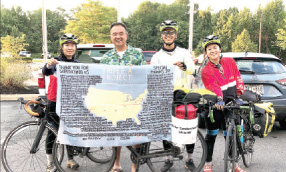


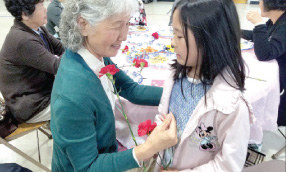
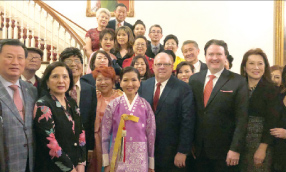
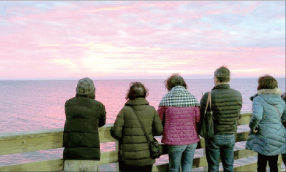
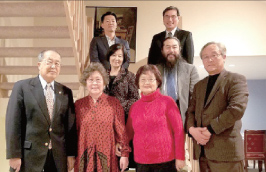
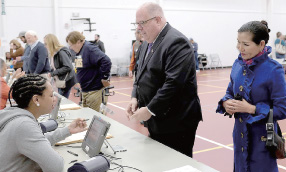





























.png)


댓글 안에 당신의 성숙함도 담아 주세요.
'오늘의 한마디'는 기사에 대하여 자신의 생각을 말하고 남의 생각을 들으며 서로 다양한 의견을 나누는 공간입니다. 그러나 간혹 불건전한 내용을 올리시는 분들이 계셔서 건전한 인터넷문화 정착을 위해 아래와 같은 운영원칙을 적용합니다.
자체 모니터링을 통해 아래에 해당하는 내용이 포함된 댓글이 발견되면 예고없이 삭제 조치를 하겠습니다.
불건전한 댓글을 올리거나, 이름에 비속어 및 상대방의 불쾌감을 주는 단어를 사용, 유명인 또는 특정 일반인을 사칭하는 경우 이용에 대한 차단 제재를 받을 수 있습니다. 차단될 경우, 일주일간 댓글을 달수 없게 됩니다.
명예훼손, 개인정보 유출, 욕설 등 법률에 위반되는 댓글은 관계 법령에 의거 민형사상 처벌을 받을 수 있으니 이용에 주의를 부탁드립니다.
Close
x